Unit 1 How can we become good learners. SectionB 1a-2e 课件(共60张PPT)
文档属性
| 名称 | Unit 1 How can we become good learners. SectionB 1a-2e 课件(共60张PPT) |
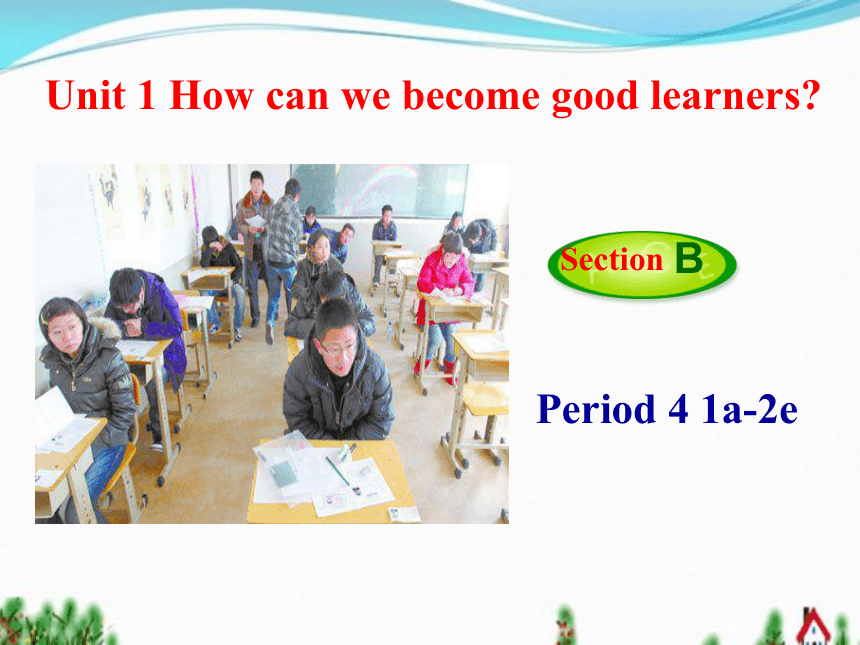
|
|
| 格式 | zip | ||
| 文件大小 | 2.2MB | ||
| 资源类型 | 教案 | ||
| 版本资源 | 人教新目标(Go for it)版 | ||
| 科目 | 英语 | ||
| 更新时间 | 2021-09-03 00:00:00 | ||
图片预览

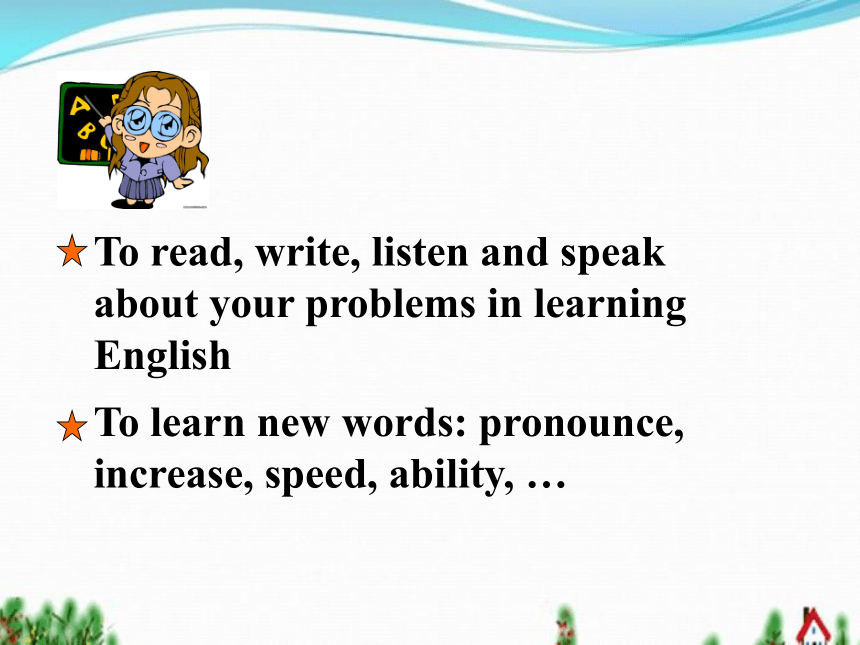
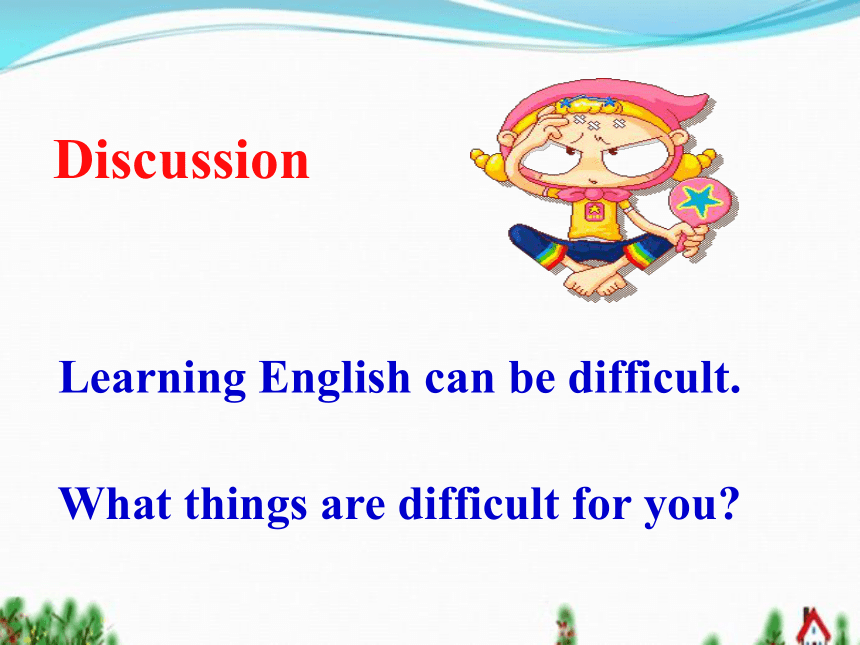
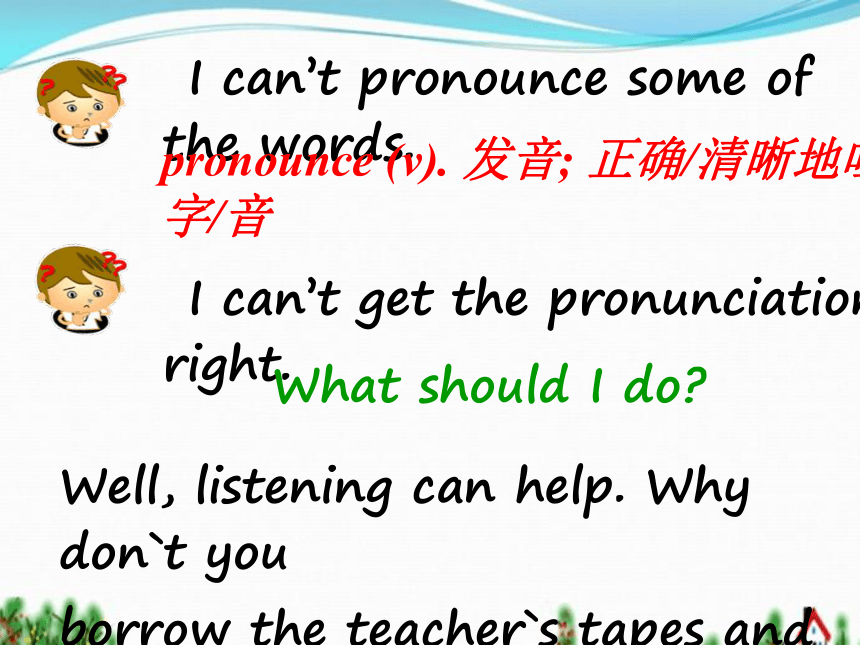
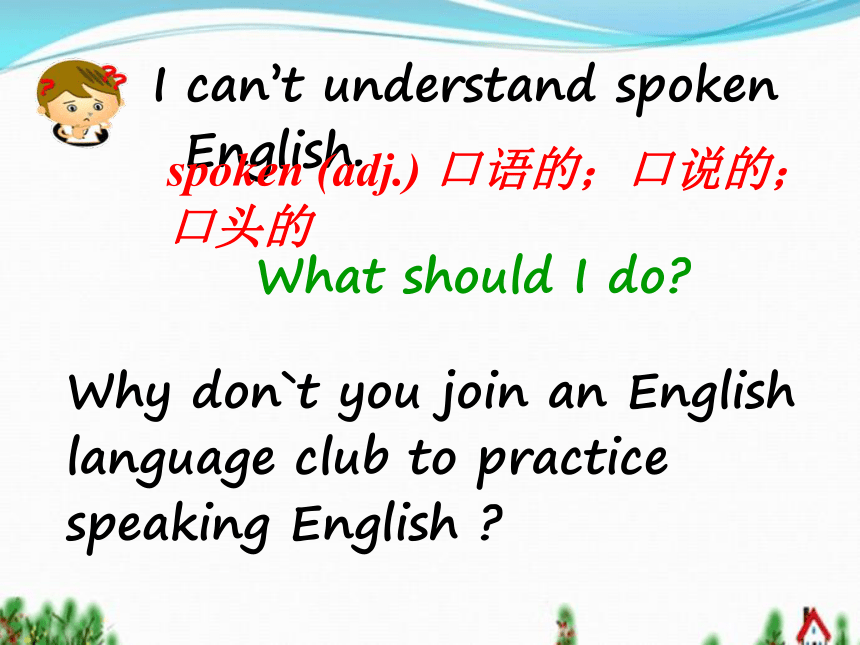
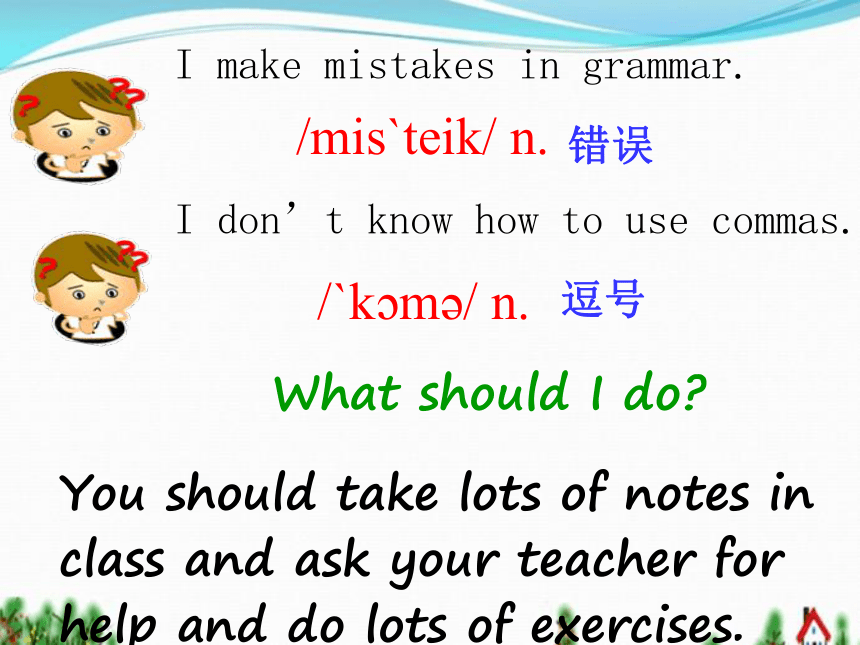
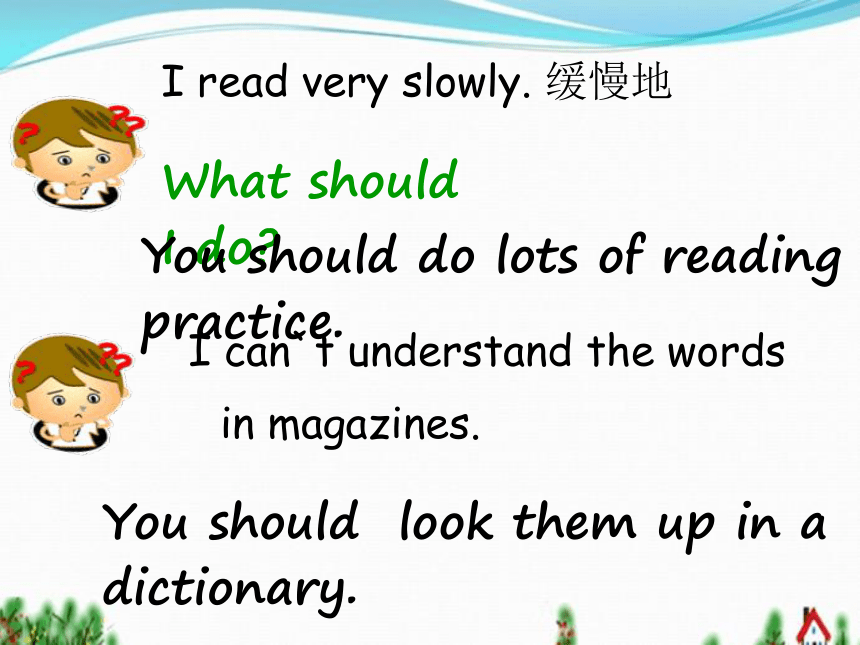
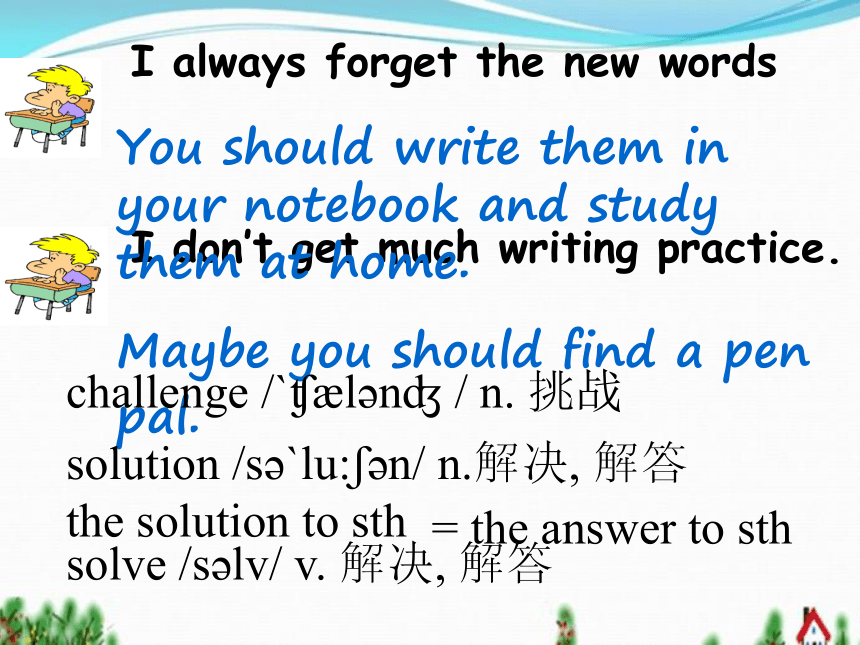
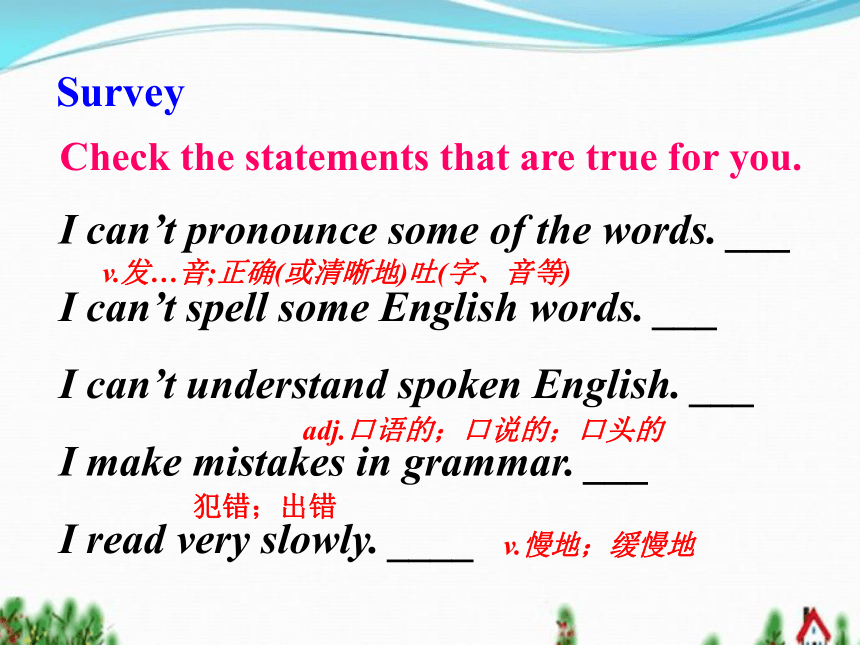
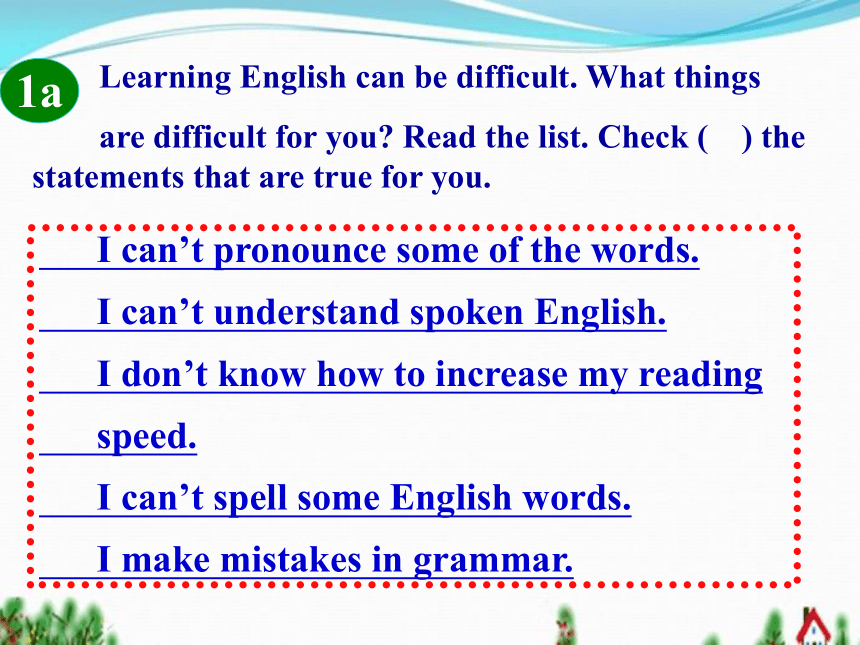
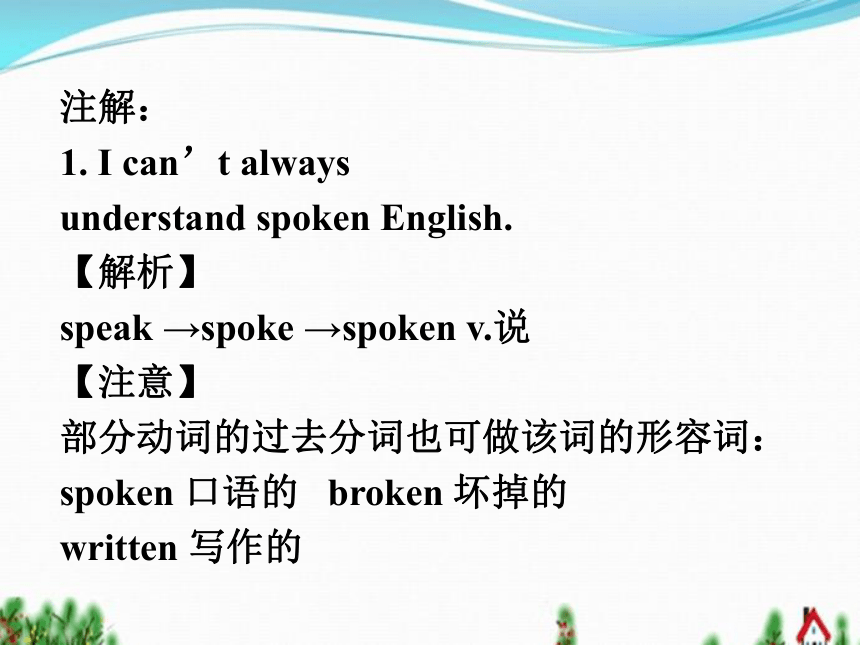
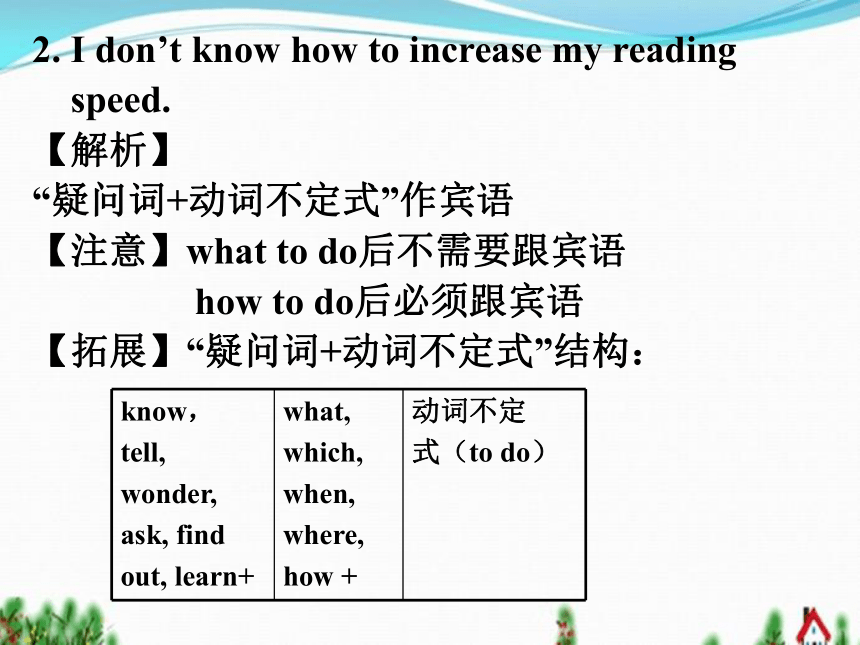
文档简介
(共60张PPT)
Section
B
Unit
1
How
can
we
become
good
learners?
Period
4
1a-2e
Objectives
To
read,
write,
listen
and
speak
about
your
problems
in
learning
English
To
learn
new
words:
pronounce,
increase,
speed,
ability,
…
Discussion
Learning
English
can
be
difficult.
What
things
are
difficult
for
you?
I
can’t
pronounce
some
of
the
words.
I
can’t
get
the
pronunciation
right.
pronounce
(v).
发音;
正确/清晰地吐字/音
What
should
I
do?
Well,
listening
can
help.
Why
don`t
you
borrow
the
teacher`s
tapes
and
listen
to
them
?
I
can’t
understand
spoken
English.
spoken
(adj.)
口语的;口说的;口头的
What
should
I
do?
Why
don`t
you
join
an
English
language
club
to
practice
speaking
English
?
I
make
mistakes
in
grammar.
I
don’t
know
how
to
use
commas.
/mis`teik/
n.
错误
/`k?m?/
n.
逗号
What
should
I
do?
You
should
take
lots
of
notes
in
class
and
ask
your
teacher
for
help
and
do
lots
of
exercises.
I
read
very
slowly.
缓慢地
What
should
I
do?
You
should
do
lots
of
reading
practice.
I
can`t
understand
the
words
in
magazines.
You
should
look
them
up
in
a
dictionary.
I
always
forget
the
new
words
I
don’t
get
much
writing
practice.
You
should
write
them
in
your
notebook
and
study
them
at
home.
Maybe
you
should
find
a
pen
pal.
challenge
/`??l?n?
/
n.
挑战
solution
/s?`lu:??n/
n.解决,
解答
solve
/s?lv/
v.
解决,
解答
the
solution
to
sth
=
the
answer
to
sth
I
can’t
pronounce
some
of
the
words.
___
I
can’t
spell
some
English
words.
___
I
can’t
understand
spoken
English.
___
I
make
mistakes
in
grammar.
___
I
read
very
slowly.
____
Check
the
statements
that
are
true
for
you.
Survey
v.发…音;正确(或清晰地)吐(字、音等)
adj.口语的;口说的;口头的
v.慢地;缓慢地
犯错;出错
Learning
English
can
be
difficult.
What
things
are
difficult
for
you?
Read
the
list.
Check
(?)
the
statements
that
are
true
for
you.
I
can’t
pronounce
some
of
the
words.
I
can’t
understand
spoken
English.
I
don’t
know
how
to
increase
my
reading
speed.
I
can’t
spell
some
English
words.
I
make
mistakes
in
grammar.
1a
注解:
1.
I?can’t?always
understand?spoken?English.?
【解析】
speak
→spoke?→spoken?v.说?
【注意】
部分动词的过去分词也可做该词的形容词:
spoken?口语的
broken?坏掉的
written?写作的
2.
I?don’t?know?how?to?increase?my?reading?
speed.?
【解析】
“疑问词+动词不定式”作宾语
【注意】what?to?do后不需要跟宾语
how?to?do后必须跟宾语
【拓展】“疑问词+动词不定式”结构:
know,
tell,?
wonder,
ask,
find?
out,?learn+
what,?
which,
when,?
where,
how?+
动词不定
式(to?do)
3.
I?often
make?mistakes?in
grammar.
(1)?make?mistakes?犯错
make?mistakes?in
在某方面犯错
(2)?mistake…
for…?把…误认为…?
(3)?by?mistake错误地
What
other
things
are
difficult
for
you?
Make
a
list.
I
don’t
know
enough
words
to
write
well.
2.
.
3.
.
1b
I
can’t
get
the
pronunciation
right
I’m
afraid
people
might
laugh
at
me
I
can’t
always
make
complete
sentences
I
forget
a
lot
of
new
words
I
can’t
understand
when
people
speak
too
quickly
I
don’t
get
much
writing
practice
I
can’t
understand
the
words
in
magazines
1b
What
other
things
are
difficult
for
you?
Make
a
list.
Listening
can
help
you.
Joining
an
English
language
club
to
practice
speaking.
You
should
read
English
aloud.
Please
try
to
talk
with
your
friends
in
English
as
much
as
possible.
Solutions
Paul
has
the
same
challenges.
Look
at
the
pictures.
What
is
he
doing?
He
is
asking
the
woman
for
help.
Who
is
the
woman?
His
English
teacher.
1.
He
can’t
get
the______________
right.
2.
He___________
a
lot
of
new
words.
3.
He
can’t
always__________
when
people
talk
to
him.
4.
He
doesn’t
get
much___________
practice.
Chanllenges
pronunciation
forgets
understand
writing
Paul
finds
it
difficult
to
learn
English.
Listen
and
complete
the
challenges
he
talks
about.
1c
1.
________________
can
help.
He
can
always_____________________
in
his
notebook
and
study
them
at
home.
He
can________________________
to
practice
speaking.
He
should
find
a_______
to
practice
writing.
Solutions
Listening
write
the
new
words
join
an
English
language
club
pen
pal
Listen
again.
Complete
the
solutions.
1d
(Problems)
Challenges
(suggestions)
Solutions
can’t
get
the
pronunciation
right
Listening
can
help.
forget
a
lat
of
new
words
You
can
always
write
the
new
words
in
your
notebook
and
study
them
at
home.
can’t
always
understand
when
people
talk
to
me
Why
don’t
you
join
an
English
language
club
to
practice
speaking
English?
don’t
get
much
writing
practice
You
should
find
a
pen
pal.
PAIRWORK
Role
play
conversations
using
the
information
in
1c
and
1d.
A:
I
don’t
have
a
partner
to
practice
English
with.
B:
Maybe
you
should
join
an
English
club.
1e
You
can
join
an
English
language
club.
You
should
join
an
….
Joining
an
English
club
can
help.
Why
don’t
you
join
an
…?
①
A:
I
don’t
have
a
partner
to
practice
English
with.
B:
Maybe
you
should
join
an
English
club.
②
A:
I
always
forget
the
new
words.
B:
You
can
write
the
new
words
in
your
notebook
and
study
them
at
home.
mistake
vt.
弄错,
误解
I
mistook
the
number
and
went
to
the
wrong
room.
我记错号码,
走错了房间。
n.
错误;
过失
Tom
didn’t
make
a
single
spelling
mistake
in
his
composition.
汤姆在这篇作文里一个字也没拼错。
make
mistakes
犯错;
出错
Language
points
challenge
n.
挑战
He
wants
a
career
that
offers
a
challenge.
他想要一份有挑战性的事业。
vt.
向......挑战;
对......提出异议
I
challenged
him
to
show
his
proof.
我要他拿出证据。
He
challenged
my
view
on
that
matter.
他就我对那件事的看法提出异议。
solution
n.
(问题、疑难等的)
解决;
解答
It
may
take
a
long
time
to
find
a
solution
to
the
problem.
也许要花很长时间才能找到解决这个问
题的办法。
The
solution
of
the
problem
requires
a
lot
of
time.
解决这个问题需要很多时间。
Maybe?you?should?join
an?English?club.?
【解析】
join/join?in/take?part?in?
(1)?join=be?a?member?of参加,
指加入某种组
织,并成为其中的一员。
join?the?army?/?party入伍/党
join?the?club加入俱乐部
◆?join?in后接活动名称
◆
join?sb.加入到某个人群之中
(2)?take?part?in参加,指加入群体活动中并在
活动中发挥重要作用。
What’s
good
leaning
habits
can
you
think
of?
Make
a
list
and
discuss
them
with
your
partner.
2a
Read
the
passage
quickly.
Which
four
habits
of
successful
learners
are
mentioned?
How
Can
You
Become
a
Successful
Learner?
Everyone
is
born
with
the
ability
to
learn.
But
whether
or
not
you
can
do
this
well
depends
on
your
learning
habits.
Research
shows
that
successful
learners
have
some
good
habits
in
common.
2b
ability
n.
能力,多为不可数名词,其后通常要接不定式。
born
v.
出生
adj.
天生的
be
born
with
天生具有
Creating
an
interest
in
what
they
learn
Studies
show
that
if
you
are
interested
in
something,
your
brain
is
more
active
and
it
is
also
easier
for
you
to
pay
attention
to
it
for
a
long
time.
Good
learners
often
connect
what
they
need
to
learn
with
something
interesting.
For
example,
if
they
need
to
learn
English
and
they
like
music
or
sports,
they
can
listen
to
English
songs
or
watch
sports
programs
in
English.
This
way
they
will
not
get
bored.
create
v.
创造,创建
brain
n.
大脑
active
adj.
活跃的
pay
attention
to
注意;关注
connect…with…
把…和…连接或联系起来
Practicing
and
learning
from
mistakes
Good
learners
think
about
what
they
are
good
at
and
what
they
need
to
practice
more.
Remember,
"use
it
or
lose
it!
Even
if
you
learn
something
well,
you
will
forget
it
unless
you
use
it.
"Practice
makes
perfect.”
Good
learners
will
keep
practicing
what
they
have
learned;
and
they
are
not
afraid
of
making
mistakes.
Alexander
Graham
Bell
did
not
invent
the
telephone
overnight.
He
succeeded
by
trying
many
times
and
learning
from
his
mistakes.
overnight
adv.
一夜之间
Developing
their
study
skills
It
is
not
enough
to
just
study
hard.
Good
learners
know
the
best
way
they
can
study.
For
example,
they
may
take
notes
by
writing
down
key
words
or
by
drawing
mind
maps.
They
also
look
for
ways
to
review
what
they
have
learned.
They
may
do
this
by
reading
their
notes
every
day
or
by
explaining
the
information
to
another
student.
review
v.
&
n.
复习;回顾
Asking
questions
Good
learners
often
ask
questions
during
or
after
class.
They
even
ask
each
other
and
try
to
find
out
the
answers.
Knowledge
comes
from
questioning.
Learning
is
a
lifelong
journey
because
every
day
brings
something
new.
Everything
that
you
learn
becomes
a
part
of
you
and
changes
you,
so
learn
wisely
and
learn
well.
knowledge
n.
知识,学问
lifelong
adj.
终身的,毕生的
wisely
adv.
明智地,聪明地
Language
Points
1.
Everyone
is
born
with
the
ability
to
learn.
But
whether
or
not
you
can
do
this
well
depends
on
your
learning
habits.
Be
born
意为“天生,出生”为被动语态,
be
动词通常用was
或were,born
为bear
的过去式。E.g.
I
was
born
in
a
small
village.
我出生在一个小山村。
He
was
born
to
succeed
in
life.
他生来注定会成功。
(2)
ability
在此处为不可数名词,意为“能力”常构成短语
have
the
ability
to
do
sth.
(
有能力做某事),
而不用
“have
the
ability
of
doing
sth”
结构。
Man
has
the
ability
to
speak.
人类有说话的能力。
(3)
whether
or
not
意为“是否”
whether引导主语从句,不能与if
替换。
whether
she
will
come
or
not
is
still
a
problem.
她是否会来还是个问题。
(4)
Depend
on
意为“
视……而定,取决于;依靠;依赖
。后接名词,代词或动名词。既不能用于进行时态也不能用于被动语态。
We
depend
on
the
newspaper
for
daily
news.
我们得靠报纸得知每天的消息。
You
may
depend
on
his
coming.
你可以相信他会来。
2.
Studies
show
that
if
you
are
interested
in
something,
your
brain
is
more
active
and
it
is
also
easier
for
you
to
pay
attention
to
it
for
a
long
time.
Active
–adj,
“活跃的,积极的”
可作表语
或定语。常用短语:take
an
active
part
in,
意为“积极参加”
Although
he
is
over
80,
he
is
still
very
active.
他虽然年过八十,但是仍很活跃。
We
all
take
a
part
in
the
sports
meeting.
我们都积极参加运动会。
(2)
pay
attention
to
意为“注意,关注”,其中to
为介词,其后可接名词、代词或动词-ing形式。
You’d
better
pay
attention
to
this
word
in
the
English
exam
last
time.
你最好注意一下上次英语考试中的这个单词。
(3)…it
is
also
easier
for
you
to
pay
attention
to
it
for
a
long
time.
该句句型是It
is
adj.
for
sb.
to
do
sth.
【注】若形容词表示事物特征的,如:easy,
difficult,?hard,
important等,须用介词for。?
It’s?+adj.
(kind,?honest,?friendly)
+
(of?sb.)?to?do?
sth.?
【注】若形容词表示人的性格、品质与特点,如:good,
kind,
nice,?wrong等,用介词of。
3.
Good
learners
often
connect
what
they
need
to
learn
with
something
they
are
interested
in.
(1)
connect…with…意为“
把……和……联系起来”
其中connect为及物动词,意为“(使)
连接;与…有联系”,其名词形式为connection,意为“连接;关系”
Please
don’t
connect
this
lesson
with
that
person.
请不要把这个人和那个人联系在一起。
(2)
need
在此处为及物动词,意为“需要”
其后跟名词、代词、动词不定式或动词-ing形式。need作实义动词时,既可用于肯定句,也可用于否定句和疑问句,构成否定和疑问句时要借助助动词do/
does/
did.
I
need
a
lot
of
money
now.
我现在很需要钱。
You
need
to
take
good
care
of
your
mother.
你要好好照顾你妈妈。
4.
Good
learners
think
about
what
they
are
good
at
and
what
they
need
to
practice
more.
Think
about
意为“考虑”其后接名词、代词、动词-ing形式或宾语从句。
They
are
thinking
about
a
serious
problem.
他们正在考虑一个严肃的问题。
(2)
Be
good
at
“擅长”
同义于
do
well
in
“在某方面做得好”
He
is
good
at
English.=
he
does
well
in
English.
5.
Even
if
you
learn
something
well,
you
will
forget
it
unless
you
use
it.
(1)Even
if
意为“即使,尽管”,用于引导让步状语从句,有退一步设想的意味,同义于“even
though”
I’ll
help
you,
even
if
I
must
stay
up
the
whole
night.
即使熬夜一整晚我也要帮助你。
(2)
forget
后直接跟名词、代词、动词不定式或动词-ing形式,但两者意义完全不同。
Forget
to
do
sth
和forget
doing
sth.
Forget
to
do
sth:
忘记去做某事
forget
doing
sth.
忘记做过某事
e.g.
I
forget
to
turn
off
the
light.
我忘记关灯了。
I
forget
turning
off
the
light.
我忘记已经关灯了。
6.
They
also
look
for
ways
to
review
what
they
have
learned.
(1)look
for
意为“寻找”
后跟名词或代词作宾语。
E.g.
they
are
looking
for
the
missing
child.
他们在寻找失踪的孩子。
比较:look
for,
find与
find
out
Look
for:
寻找,强调寻找的动作和过程,是
有目的的寻找。
find:
找到,发现,通常指找到或发现具体的东西,也可指偶然发现某物或某种情况,强调结果。
Find
out:
弄清,查明,多指通过调查、询问、研究后搞清楚、弄明白,含经过困难、曲折的意味。
7.
…,
they
are
not
afraid
of
making
mistakes.
(1)
be?afraid?of?sth/doing?sth害怕做某事
担心(出现某种不良后果)。?
(2)
be?afraid?to?do?sth?害怕去做…,
“怕”?或“不
敢”去做某事。
(3)
be?afraid?+that?恐怕…,
用于礼貌地表达可
能令人不愉快的消息。
(4)?回答别人的提问时,可用省略形式
I’m?afraid?so
(not)。
8.
They
even
ask
each
other
and
try
to
find
out
the
answers.
(1)
try?on?试穿?
(2)?try?to?do?sth.?努力做某事,侧重尽力做
(3)?try?doing?sth.?试图做某事,侧重尝试做
(4)
try?one’s?best?to?do?sth.
=?do?one’s?best?to?do?sth.?尽某人最大努力做某事
find?out寻找,查明
【拓展】find/look?for/find?out?找
(1)
find?v.
找到,强调找到的结果?
(2)
look?for?寻找,强调找东西的过程
(3)?find?out?查明,找到,指经过调查,询问
等弄清事实的真相
9.
Knowledge
comes
from
questioning.
question在句子中作动词,是“质疑;质
问;提问”的意思。例如:
I
just
accepted
what
he
told
me.
I
never
thought
to
question
it.
当question用作动词,表示对某人或事物进
行提问时,是一种十分正式的用法,有“提
问;询问;审问”的意思。例如:
The
police
questioned
him
for
three
hours
before
letting
him
go.
Does
the
writer
think
that
everyone
is
born
with
the
ability
to
learn
well?
Do
you
agree?
Why
or
why
not?
2.
Why
is
it
a
good
idea
to
connect
something
you
need
to
learn
with
something
you
are
interested
in?
Read
the
passage
again
and
answer
the
questions.
2c
No.
No,
I
don’t.
Because
whether
or
not
you
can
learn
well
depends
on
your
learning
habits.
Because
if
you
are
interested
something,
your
brain
is
more
active
and
it
is
also
easier
for
you
to
pay
attention
to
it
for
a
long
time.
3.
What
do
the
sayings
“use
it
or
lose
it”
and
“practice
makes
perfect”
mean?
Do
you
agree
with
them?
We
should
keep
practicing
what
we
have
learned.
Even
if
we
learn
something
well,
we
will
forget
it
until
we
use
it.
Yes,
I
do.
4.
Do
good
learners
learn
from
mistakes
or
are
they
afraid
of
making
mistakes?
Good
learners
learn
from
mistakes.
6.
Do
you
agree
that
learning
is
a
lifelong
journey?
Why
or
why
not?
5.
What
study
skills
does
the
writer
talk
about?
Do
you
have
those
study
skills?
Creating
an
interest
in
what
you
learn,
practicing
and
leaning
from
mistakes,
developing
study
skills
and
asking
questions.
Yes,
I
do./
No,
I
don’t.
Yes,
I
do.
Because
every
day
brings
something
new.
Look
up
the
following
words
from
the
passage
in
the
dictionary.
Then
write
a
sentence
for
each
word.
brain
n.
connect
v.
overnight
adv.
attention
n.
review
v.
knowledge
n.
ability
n.
active
adj.
wisely
adv.
e.g.
brain:
A
good
way
to
train
the
brain
is
to
do
some
math
exercises
every
day.
2d
Do
you
think
you
are
a
good
learner?
What
learning
habits
do
you
think
are
useful?
Discuss
with
your
group
and
share
your
ideas
with
the
class.
A:
I
think
another
way
to
become
a
successful
learner
is
by
trying
to
think
about
the
same
thing
in
different
ways.
B:
I
agree.
I
believe
that
...
2e
Can
you
think
of
other
ways
to
become
a
successful
learner?
Discuss
with
your
group
and
share
your
ideas
with
the
class.
A:
I
think
another
way
to
become
a
successful
learner
is
by
trying
to
think
about
the
same
thing
in
different
ways.
B:
I
agree.
I
believe
that
...
从方框中选择适当的词汇完成句子。
spoken,
difficult,
quickly,
favorite
It’s
very
_________
to
work
out
this
problem.
2.
This
girl
can’t
understand
_________
English.
3.
My
father
spoke
very
_________,
so
I
couldn’t
hear
him
clearly.
4.
What’s
your
________
way
to
learn
math?
difficult
spoken
quickly
favorite
根据汉语提示完成句子,每空一词。
1.
我姐姐从不犯语法错误。
My
sister
has
never
______
_________
___
__________.
2.
上周琳达加入了语言俱乐部。
Last
week
Linda
______
the
_________
_____.
3.
他哥哥总是在家里学习新单词。
His
brother
always
______
____
_______
___
______.
at
home
made
mistakes
in
grammar
joined
club
language
studies
new
words
Write
a
sentence
using
the
words
in
the
box.
brain
n.
connect
v.
overnight
adv.
attention
n.
review
v.
knowledge
n.
ability
n.
active
adj.
wisely
adv.
Preview
How
you
learned
to
learn
English?
What
have
helped
you
the
most
in
learning
another
language?
Section
B
Unit
1
How
can
we
become
good
learners?
Period
4
1a-2e
Objectives
To
read,
write,
listen
and
speak
about
your
problems
in
learning
English
To
learn
new
words:
pronounce,
increase,
speed,
ability,
…
Discussion
Learning
English
can
be
difficult.
What
things
are
difficult
for
you?
I
can’t
pronounce
some
of
the
words.
I
can’t
get
the
pronunciation
right.
pronounce
(v).
发音;
正确/清晰地吐字/音
What
should
I
do?
Well,
listening
can
help.
Why
don`t
you
borrow
the
teacher`s
tapes
and
listen
to
them
?
I
can’t
understand
spoken
English.
spoken
(adj.)
口语的;口说的;口头的
What
should
I
do?
Why
don`t
you
join
an
English
language
club
to
practice
speaking
English
?
I
make
mistakes
in
grammar.
I
don’t
know
how
to
use
commas.
/mis`teik/
n.
错误
/`k?m?/
n.
逗号
What
should
I
do?
You
should
take
lots
of
notes
in
class
and
ask
your
teacher
for
help
and
do
lots
of
exercises.
I
read
very
slowly.
缓慢地
What
should
I
do?
You
should
do
lots
of
reading
practice.
I
can`t
understand
the
words
in
magazines.
You
should
look
them
up
in
a
dictionary.
I
always
forget
the
new
words
I
don’t
get
much
writing
practice.
You
should
write
them
in
your
notebook
and
study
them
at
home.
Maybe
you
should
find
a
pen
pal.
challenge
/`??l?n?
/
n.
挑战
solution
/s?`lu:??n/
n.解决,
解答
solve
/s?lv/
v.
解决,
解答
the
solution
to
sth
=
the
answer
to
sth
I
can’t
pronounce
some
of
the
words.
___
I
can’t
spell
some
English
words.
___
I
can’t
understand
spoken
English.
___
I
make
mistakes
in
grammar.
___
I
read
very
slowly.
____
Check
the
statements
that
are
true
for
you.
Survey
v.发…音;正确(或清晰地)吐(字、音等)
adj.口语的;口说的;口头的
v.慢地;缓慢地
犯错;出错
Learning
English
can
be
difficult.
What
things
are
difficult
for
you?
Read
the
list.
Check
(?)
the
statements
that
are
true
for
you.
I
can’t
pronounce
some
of
the
words.
I
can’t
understand
spoken
English.
I
don’t
know
how
to
increase
my
reading
speed.
I
can’t
spell
some
English
words.
I
make
mistakes
in
grammar.
1a
注解:
1.
I?can’t?always
understand?spoken?English.?
【解析】
speak
→spoke?→spoken?v.说?
【注意】
部分动词的过去分词也可做该词的形容词:
spoken?口语的
broken?坏掉的
written?写作的
2.
I?don’t?know?how?to?increase?my?reading?
speed.?
【解析】
“疑问词+动词不定式”作宾语
【注意】what?to?do后不需要跟宾语
how?to?do后必须跟宾语
【拓展】“疑问词+动词不定式”结构:
know,
tell,?
wonder,
ask,
find?
out,?learn+
what,?
which,
when,?
where,
how?+
动词不定
式(to?do)
3.
I?often
make?mistakes?in
grammar.
(1)?make?mistakes?犯错
make?mistakes?in
在某方面犯错
(2)?mistake…
for…?把…误认为…?
(3)?by?mistake错误地
What
other
things
are
difficult
for
you?
Make
a
list.
I
don’t
know
enough
words
to
write
well.
2.
.
3.
.
1b
I
can’t
get
the
pronunciation
right
I’m
afraid
people
might
laugh
at
me
I
can’t
always
make
complete
sentences
I
forget
a
lot
of
new
words
I
can’t
understand
when
people
speak
too
quickly
I
don’t
get
much
writing
practice
I
can’t
understand
the
words
in
magazines
1b
What
other
things
are
difficult
for
you?
Make
a
list.
Listening
can
help
you.
Joining
an
English
language
club
to
practice
speaking.
You
should
read
English
aloud.
Please
try
to
talk
with
your
friends
in
English
as
much
as
possible.
Solutions
Paul
has
the
same
challenges.
Look
at
the
pictures.
What
is
he
doing?
He
is
asking
the
woman
for
help.
Who
is
the
woman?
His
English
teacher.
1.
He
can’t
get
the______________
right.
2.
He___________
a
lot
of
new
words.
3.
He
can’t
always__________
when
people
talk
to
him.
4.
He
doesn’t
get
much___________
practice.
Chanllenges
pronunciation
forgets
understand
writing
Paul
finds
it
difficult
to
learn
English.
Listen
and
complete
the
challenges
he
talks
about.
1c
1.
________________
can
help.
He
can
always_____________________
in
his
notebook
and
study
them
at
home.
He
can________________________
to
practice
speaking.
He
should
find
a_______
to
practice
writing.
Solutions
Listening
write
the
new
words
join
an
English
language
club
pen
pal
Listen
again.
Complete
the
solutions.
1d
(Problems)
Challenges
(suggestions)
Solutions
can’t
get
the
pronunciation
right
Listening
can
help.
forget
a
lat
of
new
words
You
can
always
write
the
new
words
in
your
notebook
and
study
them
at
home.
can’t
always
understand
when
people
talk
to
me
Why
don’t
you
join
an
English
language
club
to
practice
speaking
English?
don’t
get
much
writing
practice
You
should
find
a
pen
pal.
PAIRWORK
Role
play
conversations
using
the
information
in
1c
and
1d.
A:
I
don’t
have
a
partner
to
practice
English
with.
B:
Maybe
you
should
join
an
English
club.
1e
You
can
join
an
English
language
club.
You
should
join
an
….
Joining
an
English
club
can
help.
Why
don’t
you
join
an
…?
①
A:
I
don’t
have
a
partner
to
practice
English
with.
B:
Maybe
you
should
join
an
English
club.
②
A:
I
always
forget
the
new
words.
B:
You
can
write
the
new
words
in
your
notebook
and
study
them
at
home.
mistake
vt.
弄错,
误解
I
mistook
the
number
and
went
to
the
wrong
room.
我记错号码,
走错了房间。
n.
错误;
过失
Tom
didn’t
make
a
single
spelling
mistake
in
his
composition.
汤姆在这篇作文里一个字也没拼错。
make
mistakes
犯错;
出错
Language
points
challenge
n.
挑战
He
wants
a
career
that
offers
a
challenge.
他想要一份有挑战性的事业。
vt.
向......挑战;
对......提出异议
I
challenged
him
to
show
his
proof.
我要他拿出证据。
He
challenged
my
view
on
that
matter.
他就我对那件事的看法提出异议。
solution
n.
(问题、疑难等的)
解决;
解答
It
may
take
a
long
time
to
find
a
solution
to
the
problem.
也许要花很长时间才能找到解决这个问
题的办法。
The
solution
of
the
problem
requires
a
lot
of
time.
解决这个问题需要很多时间。
Maybe?you?should?join
an?English?club.?
【解析】
join/join?in/take?part?in?
(1)?join=be?a?member?of参加,
指加入某种组
织,并成为其中的一员。
join?the?army?/?party入伍/党
join?the?club加入俱乐部
◆?join?in后接活动名称
◆
join?sb.加入到某个人群之中
(2)?take?part?in参加,指加入群体活动中并在
活动中发挥重要作用。
What’s
good
leaning
habits
can
you
think
of?
Make
a
list
and
discuss
them
with
your
partner.
2a
Read
the
passage
quickly.
Which
four
habits
of
successful
learners
are
mentioned?
How
Can
You
Become
a
Successful
Learner?
Everyone
is
born
with
the
ability
to
learn.
But
whether
or
not
you
can
do
this
well
depends
on
your
learning
habits.
Research
shows
that
successful
learners
have
some
good
habits
in
common.
2b
ability
n.
能力,多为不可数名词,其后通常要接不定式。
born
v.
出生
adj.
天生的
be
born
with
天生具有
Creating
an
interest
in
what
they
learn
Studies
show
that
if
you
are
interested
in
something,
your
brain
is
more
active
and
it
is
also
easier
for
you
to
pay
attention
to
it
for
a
long
time.
Good
learners
often
connect
what
they
need
to
learn
with
something
interesting.
For
example,
if
they
need
to
learn
English
and
they
like
music
or
sports,
they
can
listen
to
English
songs
or
watch
sports
programs
in
English.
This
way
they
will
not
get
bored.
create
v.
创造,创建
brain
n.
大脑
active
adj.
活跃的
pay
attention
to
注意;关注
connect…with…
把…和…连接或联系起来
Practicing
and
learning
from
mistakes
Good
learners
think
about
what
they
are
good
at
and
what
they
need
to
practice
more.
Remember,
"use
it
or
lose
it!
Even
if
you
learn
something
well,
you
will
forget
it
unless
you
use
it.
"Practice
makes
perfect.”
Good
learners
will
keep
practicing
what
they
have
learned;
and
they
are
not
afraid
of
making
mistakes.
Alexander
Graham
Bell
did
not
invent
the
telephone
overnight.
He
succeeded
by
trying
many
times
and
learning
from
his
mistakes.
overnight
adv.
一夜之间
Developing
their
study
skills
It
is
not
enough
to
just
study
hard.
Good
learners
know
the
best
way
they
can
study.
For
example,
they
may
take
notes
by
writing
down
key
words
or
by
drawing
mind
maps.
They
also
look
for
ways
to
review
what
they
have
learned.
They
may
do
this
by
reading
their
notes
every
day
or
by
explaining
the
information
to
another
student.
review
v.
&
n.
复习;回顾
Asking
questions
Good
learners
often
ask
questions
during
or
after
class.
They
even
ask
each
other
and
try
to
find
out
the
answers.
Knowledge
comes
from
questioning.
Learning
is
a
lifelong
journey
because
every
day
brings
something
new.
Everything
that
you
learn
becomes
a
part
of
you
and
changes
you,
so
learn
wisely
and
learn
well.
knowledge
n.
知识,学问
lifelong
adj.
终身的,毕生的
wisely
adv.
明智地,聪明地
Language
Points
1.
Everyone
is
born
with
the
ability
to
learn.
But
whether
or
not
you
can
do
this
well
depends
on
your
learning
habits.
Be
born
意为“天生,出生”为被动语态,
be
动词通常用was
或were,born
为bear
的过去式。E.g.
I
was
born
in
a
small
village.
我出生在一个小山村。
He
was
born
to
succeed
in
life.
他生来注定会成功。
(2)
ability
在此处为不可数名词,意为“能力”常构成短语
have
the
ability
to
do
sth.
(
有能力做某事),
而不用
“have
the
ability
of
doing
sth”
结构。
Man
has
the
ability
to
speak.
人类有说话的能力。
(3)
whether
or
not
意为“是否”
whether引导主语从句,不能与if
替换。
whether
she
will
come
or
not
is
still
a
problem.
她是否会来还是个问题。
(4)
Depend
on
意为“
视……而定,取决于;依靠;依赖
。后接名词,代词或动名词。既不能用于进行时态也不能用于被动语态。
We
depend
on
the
newspaper
for
daily
news.
我们得靠报纸得知每天的消息。
You
may
depend
on
his
coming.
你可以相信他会来。
2.
Studies
show
that
if
you
are
interested
in
something,
your
brain
is
more
active
and
it
is
also
easier
for
you
to
pay
attention
to
it
for
a
long
time.
Active
–adj,
“活跃的,积极的”
可作表语
或定语。常用短语:take
an
active
part
in,
意为“积极参加”
Although
he
is
over
80,
he
is
still
very
active.
他虽然年过八十,但是仍很活跃。
We
all
take
a
part
in
the
sports
meeting.
我们都积极参加运动会。
(2)
pay
attention
to
意为“注意,关注”,其中to
为介词,其后可接名词、代词或动词-ing形式。
You’d
better
pay
attention
to
this
word
in
the
English
exam
last
time.
你最好注意一下上次英语考试中的这个单词。
(3)…it
is
also
easier
for
you
to
pay
attention
to
it
for
a
long
time.
该句句型是It
is
adj.
for
sb.
to
do
sth.
【注】若形容词表示事物特征的,如:easy,
difficult,?hard,
important等,须用介词for。?
It’s?+adj.
(kind,?honest,?friendly)
+
(of?sb.)?to?do?
sth.?
【注】若形容词表示人的性格、品质与特点,如:good,
kind,
nice,?wrong等,用介词of。
3.
Good
learners
often
connect
what
they
need
to
learn
with
something
they
are
interested
in.
(1)
connect…with…意为“
把……和……联系起来”
其中connect为及物动词,意为“(使)
连接;与…有联系”,其名词形式为connection,意为“连接;关系”
Please
don’t
connect
this
lesson
with
that
person.
请不要把这个人和那个人联系在一起。
(2)
need
在此处为及物动词,意为“需要”
其后跟名词、代词、动词不定式或动词-ing形式。need作实义动词时,既可用于肯定句,也可用于否定句和疑问句,构成否定和疑问句时要借助助动词do/
does/
did.
I
need
a
lot
of
money
now.
我现在很需要钱。
You
need
to
take
good
care
of
your
mother.
你要好好照顾你妈妈。
4.
Good
learners
think
about
what
they
are
good
at
and
what
they
need
to
practice
more.
Think
about
意为“考虑”其后接名词、代词、动词-ing形式或宾语从句。
They
are
thinking
about
a
serious
problem.
他们正在考虑一个严肃的问题。
(2)
Be
good
at
“擅长”
同义于
do
well
in
“在某方面做得好”
He
is
good
at
English.=
he
does
well
in
English.
5.
Even
if
you
learn
something
well,
you
will
forget
it
unless
you
use
it.
(1)Even
if
意为“即使,尽管”,用于引导让步状语从句,有退一步设想的意味,同义于“even
though”
I’ll
help
you,
even
if
I
must
stay
up
the
whole
night.
即使熬夜一整晚我也要帮助你。
(2)
forget
后直接跟名词、代词、动词不定式或动词-ing形式,但两者意义完全不同。
Forget
to
do
sth
和forget
doing
sth.
Forget
to
do
sth:
忘记去做某事
forget
doing
sth.
忘记做过某事
e.g.
I
forget
to
turn
off
the
light.
我忘记关灯了。
I
forget
turning
off
the
light.
我忘记已经关灯了。
6.
They
also
look
for
ways
to
review
what
they
have
learned.
(1)look
for
意为“寻找”
后跟名词或代词作宾语。
E.g.
they
are
looking
for
the
missing
child.
他们在寻找失踪的孩子。
比较:look
for,
find与
find
out
Look
for:
寻找,强调寻找的动作和过程,是
有目的的寻找。
find:
找到,发现,通常指找到或发现具体的东西,也可指偶然发现某物或某种情况,强调结果。
Find
out:
弄清,查明,多指通过调查、询问、研究后搞清楚、弄明白,含经过困难、曲折的意味。
7.
…,
they
are
not
afraid
of
making
mistakes.
(1)
be?afraid?of?sth/doing?sth害怕做某事
担心(出现某种不良后果)。?
(2)
be?afraid?to?do?sth?害怕去做…,
“怕”?或“不
敢”去做某事。
(3)
be?afraid?+that?恐怕…,
用于礼貌地表达可
能令人不愉快的消息。
(4)?回答别人的提问时,可用省略形式
I’m?afraid?so
(not)。
8.
They
even
ask
each
other
and
try
to
find
out
the
answers.
(1)
try?on?试穿?
(2)?try?to?do?sth.?努力做某事,侧重尽力做
(3)?try?doing?sth.?试图做某事,侧重尝试做
(4)
try?one’s?best?to?do?sth.
=?do?one’s?best?to?do?sth.?尽某人最大努力做某事
find?out寻找,查明
【拓展】find/look?for/find?out?找
(1)
find?v.
找到,强调找到的结果?
(2)
look?for?寻找,强调找东西的过程
(3)?find?out?查明,找到,指经过调查,询问
等弄清事实的真相
9.
Knowledge
comes
from
questioning.
question在句子中作动词,是“质疑;质
问;提问”的意思。例如:
I
just
accepted
what
he
told
me.
I
never
thought
to
question
it.
当question用作动词,表示对某人或事物进
行提问时,是一种十分正式的用法,有“提
问;询问;审问”的意思。例如:
The
police
questioned
him
for
three
hours
before
letting
him
go.
Does
the
writer
think
that
everyone
is
born
with
the
ability
to
learn
well?
Do
you
agree?
Why
or
why
not?
2.
Why
is
it
a
good
idea
to
connect
something
you
need
to
learn
with
something
you
are
interested
in?
Read
the
passage
again
and
answer
the
questions.
2c
No.
No,
I
don’t.
Because
whether
or
not
you
can
learn
well
depends
on
your
learning
habits.
Because
if
you
are
interested
something,
your
brain
is
more
active
and
it
is
also
easier
for
you
to
pay
attention
to
it
for
a
long
time.
3.
What
do
the
sayings
“use
it
or
lose
it”
and
“practice
makes
perfect”
mean?
Do
you
agree
with
them?
We
should
keep
practicing
what
we
have
learned.
Even
if
we
learn
something
well,
we
will
forget
it
until
we
use
it.
Yes,
I
do.
4.
Do
good
learners
learn
from
mistakes
or
are
they
afraid
of
making
mistakes?
Good
learners
learn
from
mistakes.
6.
Do
you
agree
that
learning
is
a
lifelong
journey?
Why
or
why
not?
5.
What
study
skills
does
the
writer
talk
about?
Do
you
have
those
study
skills?
Creating
an
interest
in
what
you
learn,
practicing
and
leaning
from
mistakes,
developing
study
skills
and
asking
questions.
Yes,
I
do./
No,
I
don’t.
Yes,
I
do.
Because
every
day
brings
something
new.
Look
up
the
following
words
from
the
passage
in
the
dictionary.
Then
write
a
sentence
for
each
word.
brain
n.
connect
v.
overnight
adv.
attention
n.
review
v.
knowledge
n.
ability
n.
active
adj.
wisely
adv.
e.g.
brain:
A
good
way
to
train
the
brain
is
to
do
some
math
exercises
every
day.
2d
Do
you
think
you
are
a
good
learner?
What
learning
habits
do
you
think
are
useful?
Discuss
with
your
group
and
share
your
ideas
with
the
class.
A:
I
think
another
way
to
become
a
successful
learner
is
by
trying
to
think
about
the
same
thing
in
different
ways.
B:
I
agree.
I
believe
that
...
2e
Can
you
think
of
other
ways
to
become
a
successful
learner?
Discuss
with
your
group
and
share
your
ideas
with
the
class.
A:
I
think
another
way
to
become
a
successful
learner
is
by
trying
to
think
about
the
same
thing
in
different
ways.
B:
I
agree.
I
believe
that
...
从方框中选择适当的词汇完成句子。
spoken,
difficult,
quickly,
favorite
It’s
very
_________
to
work
out
this
problem.
2.
This
girl
can’t
understand
_________
English.
3.
My
father
spoke
very
_________,
so
I
couldn’t
hear
him
clearly.
4.
What’s
your
________
way
to
learn
math?
difficult
spoken
quickly
favorite
根据汉语提示完成句子,每空一词。
1.
我姐姐从不犯语法错误。
My
sister
has
never
______
_________
___
__________.
2.
上周琳达加入了语言俱乐部。
Last
week
Linda
______
the
_________
_____.
3.
他哥哥总是在家里学习新单词。
His
brother
always
______
____
_______
___
______.
at
home
made
mistakes
in
grammar
joined
club
language
studies
new
words
Write
a
sentence
using
the
words
in
the
box.
brain
n.
connect
v.
overnight
adv.
attention
n.
review
v.
knowledge
n.
ability
n.
active
adj.
wisely
adv.
Preview
How
you
learned
to
learn
English?
What
have
helped
you
the
most
in
learning
another
language?
同课章节目录
- Unit 1 How can we become good learners.
- Section A
- Section B
- Unit 2 I think that mooncakes are delicious!
- Section A
- Section B
- Unit 3 Could you please tell me where the restroom
- Section A
- Section B
- Unit 4 I used to be afraid of the dark.
- Section A
- Section B
- Unit 5 What are the shirts made of?
- Section A
- Section B
- Review of Units 1-5
- Unit 6 When was it invented?
- Section A
- Section B
- Unit 7 Teenagers should be allowed to choose their
- Section A
- Section B
- Unit 8 It must belong to Carla.
- Section A
- Section B
- Unit 9 I like music that I can dance to.
- Section A
- Section B
- Unit 10 You're supposed to shake hands.
- Section A
- Section B
- Review of Units 6-10
- Unit 11 Sad movies make me cry.
- Section A
- Section B
- Unit 12 Life is full of the unexpected
- Section A
- Section B
- Unit 13 We're trying to save the earth!
- Section A
- Section B
- Unit 14 I remember meeting all of you in Grade 7.
- Section A
- Section B
- Review of Units 11-14
